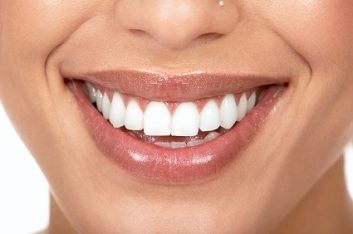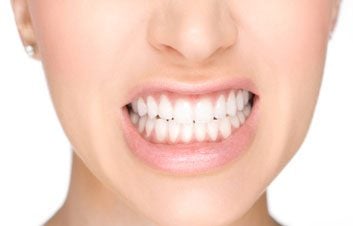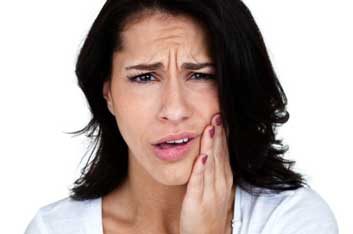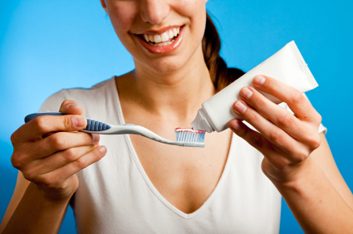
Get a brighter smile
Adults’ teeth are normally pale grey or yellow, not bright white, and often these shades slowly deepen over time as our enamel thins, revealing the less-white layer of dentin beneath it. Plus, the things we eat and drink every day-like coffee, grape juice and even soy sauce-can leave stains behind.
A dazzlingly bright smile may not be natural (remember Ross’s adventure with teeth whitening on Friends?), but that hasn’t stopped Canadians from wanting one. A 2012 survey by Procter & Gamble Canada showed (not surprisingly) that most of us-86 percent-would prefer to have whiter teeth. Today, there are many whitening products available from your dentist or drugstore.
Here’s what to keep in mind before you try them:

Teeth-whitening products all have different strengths
The teeth-whitening products you leave on your teeth for five, 20, 30 or more minutes-like drugstore strips and gel trays, and dental-office gels-are designed to restore a tooth’s enamel by removing dirt and debris. These products all contain hydrogen peroxide (or a compound that breaks down into hydrogen peroxide, like carbamide peroxide). It releases oxygen molecules in your mouth that react chemically with staining materials, and lift them. “They all work the same way,” says Dr. Bruce Ward, a North Vancouver dentist, “and they all work to some extent.”
However, the strength of hydrogen peroxide varies widely: It’s typically from three to 15 percent in drugstore products, and anywhere from 15 to almost 40 percent at the dental office. Plus, Ward says, “there are different delivery systems.”

Some people are more sensitive than others
People have varying needs and lifestyles, and some approaches may be a better match than others. Even the way your mouth looks afterwards-and feels, since gum irritation, temporary sensitivity and pain in the teeth are possible side effects-may differ depending on which product you pick. “The way the teeth respond to treatments at home or in the office is very individual,” says registered dental hygienist Sally Lloyd in Calgary.

It’s unlikely you’ll destroy tooth enamel
One thing that won’t happen, at least in the short term: You’re not likely to destroy your tooth enamel, as long as you follow directions and don’t leave the whitener on your teeth for longer than recommended. “That’s a myth,” says Ward. “There’s no evidence of damage in the short term.” It’s not yet known whether extreme or long-term use can cause harm.

Some people shouldn’t whiten their teeth
Even though whitening systems are considered safe, they may not be for everybody, including women who are pregnant or breastfeeding, adolescents who still have baby teeth, and people with gum disease or sensitive teeth. Whiteners won’t change the colour of crowns, fillings or dead teeth (although you can opt for whiter fillings to match a soon-to-be-sparkling smile).

Whitening doesn’t last forever
To help you make your choice, check with your dentist‘s office. “We can tell you about the solutions and all the available products, so you can make an informed decision,” notes Lloyd. She adds that sometimes, simply improving your brushing technique or getting a professional cleaning (the general recommendation is every six months) will leave you with noticeably whiter teeth.
Whatever whitening system you settle on, keep in mind the effects won’t last forever. It’s only a matter of time, whether that’s months or years, before your teeth will be ready for a touch-up.

You can’t predict how sensitive you’ll be
It’s impossible to predict the degree of sensitivity and pain, if any, you’ll feel after whitening treatment. Some treatments include a desensitizing gel like amorphous calcium phosphate (ACP), which may help when you apply it before or after whitening, or your dentist may recommend ibuprofen before or after a treatment. Even a desensitizing toothpaste containing fluoride, or a fluoride mouth rinse, may make a difference: “Fluoride is a very good tooth desensitizer,” dentist Bruce Ward says. If you’re having trouble with a take-home kit, try taking a two- or three-day break before continuing, or apply the whitener for half the time period that’s directed. If you decide to grit your teeth and bear it, remember the discomfort tends to be temporary.

There are other ways to keep your teeth white
Maybe you don’t want to pour money into products, and have heard about homemade whitening formulas with lemon juice, baking soda or crushed strawberries. Not the best idea, say experts, as they bathe teeth in acid. “You can end up with more sensitive teeth, and lose some tooth structure,” says Ward. To keep your teeth white without paying for it, brush soon after consuming stain culprits like coffee, red wine, tea or blueberry pie. Try adding dairy or soy milk to your tea or coffee instead of taking it black. And if you smoke, quit: Stains caused by cigarettes are almost impossible to remove.
Related:
• 4 foods that are bad for your teeth
• What to eat for whiter teeth
• 5 foods that will destroy your teeth
